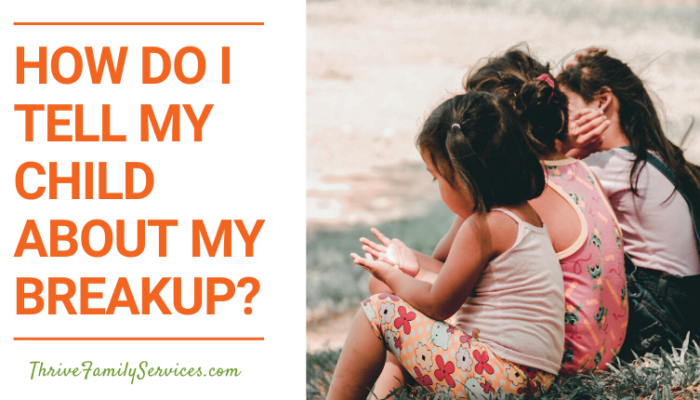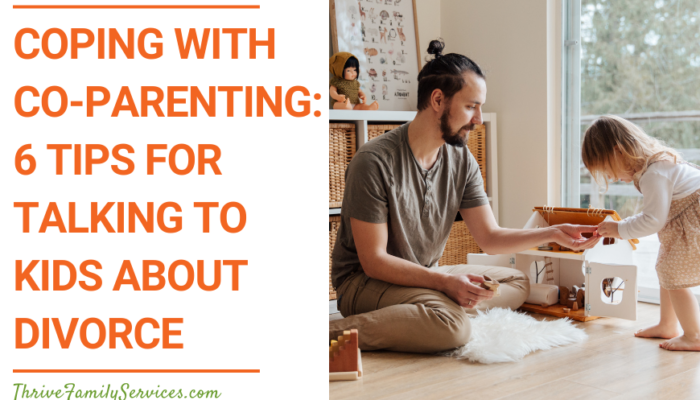Children are usually a big factor in helping couples decide whether they should break up or not. As parents, we want what is best for our child and try our best to predict what that will be. Sometimes, parents will try to stay together and work out their differences for the sake of their children. Other times, parents come to the conclusion that it is best for their children if they break up.
No one enters into a marriage assuming that it won’t work out. Divorce or separation can be an incredibly painful event for everyone involved – children included. However, there are steps that parents can take to make their breakup easier on their kids.
Like most parents know, children do better with predictability. It is soothing to a child’s emotional system to be able to predict a routine. Like any upcoming change that a child may face, it’s important that parents explain the end of their relationship slowly, carefully, and in an age-appropriate way.
The goal should be to help your child process and move through this change in the healthiest way possible – not the fastest or most convenient.
Research shows us that a child’s emotional security and ability to successfully function as an adult has less to do with what actually happened in their childhood. Rather, the best predictor for childhood attachment security is how the child made sense of their childhood experiences – usually with the help of an adult.
If you and your ex-partner have made the decision to end your relationship, this could be the most important story you’ll ever tell your child.
Tell your child a story that he or she can use as a map to understand what happened, how you got there, and where you wish to go. This story will hopefully allow your child to understand that this change that will eventually bring them inner peace.
You don’t have to come up with an elaborate story or metaphor to help your child understand that their family dynamics are changing. In fact, it’s better to keep it simple. Take ownership of the change in your child’s world in a calm and confident way. Any mention of yourself and the other parent should be kind, caring, and respectful. Emphasize your love for the child and that it will never go away.
If possible, it is best for your child to hear this story with both parents. It can be very distressing for a child (or teenager) to hear that their parents are breaking up without both parents around.
You and your co-parent probably know your child pretty well. If possible, see if you two can work out what story you want to tell your child as a team. It’s important to be as honest as possible in an age-appropriate way. It’s also just as important to not paint yourself or the other parent as the victim or villain in the story. There are ways to neutrally and truthfully explain a breakup to children. If you and your partner have trouble coming up with a story that feels right, a therapist can help!
Even if your child is too young to comprehend the changes when they are happening, there’s a good chance that the child will want to know the story of the breakup when they get older. Go ahead and agree on the story you want to tell your child about your breakup with your co-parent. It will give you both piece of mind for when the questions start coming.
Once you come up with your story for your child, here are ten specific things that you can do to make sure that the storytelling is done in an effective and helpful way:
1. Share the Story Soon
As mentioned before, change can be distressing for children, and they need time to adjust. The sooner you share your story, the sooner your child can start adjusting to the breakup. Being able to give your child a heads-up about when one parent is moving out and where that parent is going is crucial. It’s much easier for children to hear the news and get an understanding of what is happening before it starts to happen.
2. Choose a Good Time
Sometimes, children don’t have a lot of questions or immediate strong emotions about the story of their parents’ breakup. Other times they do. It’s important that you give time for either reaction and not rush your child to digest the news because of a time constraint.
Sharing the story of the breakup with your child before school or before their bedtime, for example, might make it harder for your child to have an appropriate amount of time to digest the information and respond.
3. Have Time for Questions
An important part of making sure your child understands what is happening is by letting your child ask questions and answering them as honestly as possible. Your child might have logistical questions, like what days they’ll have to spend with each parent. They might have emotional questions, like if you still love their other parent. Make sure your child feels free to ask any questions that he or she has about this change. Also, make sure that your child knows that if they don’t have questions immediately, you want to hear their questions about the breakup whenever they occur.
4. Be Alert in the Time After the Breakup
It can take days, weeks, or months for children to process this change, so it is important that parents are aware of their child’s emotional well-being in the time after the story of divorce has been shared.
Depending on the child’s age, he or she might not be clear about signs of distress. For example, they might say, “My tummy hurts” if they don’t know to recognize stomach knots as nervousness, sadness, or fear. If your child’s behavior starts changing, that can also be a sign that your child needs your emotional attention.
5. Be Patient with your Child’s Emotions and Behaviors
Children experience a wide range of emotions when hearing the news that their parents are splitting up. Some of them might not make sense to you, so having some patience is crucial to knowing that your child feels safe to have emotional reactions around you. Nightmares, clinginess, withdrawal, and other behavioral changes are important to note.
If your child senses that you are frustrated with the way they are processing their emotions about the breakup, they might be tempted to keep things inside. Your child needs to know that they can go to you – regardless of their age.
6. Create a Support System for your Child
If you can, tell other trusted adults in your child’s life about your breakup and any other changes going on. It’s a great idea for your child to have other people that they can talk to and get comfort from during this transition. Tell your child’s teachers, get them a child or family therapist, find books on the topic of divorce… whatever you are able to do to provide extra support for your child is a good idea! Then, make sure your child knows who is in their support system so that they know how to utilize it.
7. Don’t Drag the Breakup Out
Once your child knows the story of their parents’ divorce, don’t drag the process of the divorce out for long. Although children need time to adjust to the changes, it is better for their mental and emotional health to not be anticipating these changes for longer than necessary.
8. Comfort your Child – Not the Other Way Around
One mistake that parents can make – especially with their older children – is leaning on the child for comfort. It’s very tempting to think that you are all going through this together, so you should all be there for each other. However, it is best for the child if they do not feel like they have to be a source of comfort in their pain. Make sure your child knows that you are there to comfort them, not the other way around. Parents should find their own support system in people and resources that are not their children.
9. Be Aware that your Child will be Grieving
There is a loss associated with divorce – even for kids. Sometimes parents expect their kids to feel some sort of relief at the news of their parents’ divorce, especially if they’ve been exposed to lots of fighting. Even if you have heard your child tell you that they want you to divorce, your child will still be going through a grieving process. Grief shows up in a lot of different forms. It can look like anger, sadness, apathy, confusion… It can be helpful to let your child know that you are aware that they are experiencing a loss in the end of their parents’ relationship. Open the door for them to process their grief with you or someone else that they trust.
10. Try Emotion Coaching
Finally, helping your child anticipate, name, and regulate their emotions during this time is a great way to monitor their wellbeing and set them up for success. When you see your child acting differently, when they reach out to you, or when you can see emotion on their face, help your child figure out what they are feeling, why they are feeling it, and what to do about it.
This is all a part of the story of their parents’ relationship ending, so it is important that you help them get a full comprehension of their own experience of it.
Therapists are great resources for more help with changing family dynamics, talking to your child, or for your own emotional support. If you need more support talking to your child about your breakup, our Greenwood Village couples therapists can help you come up with a plan.



